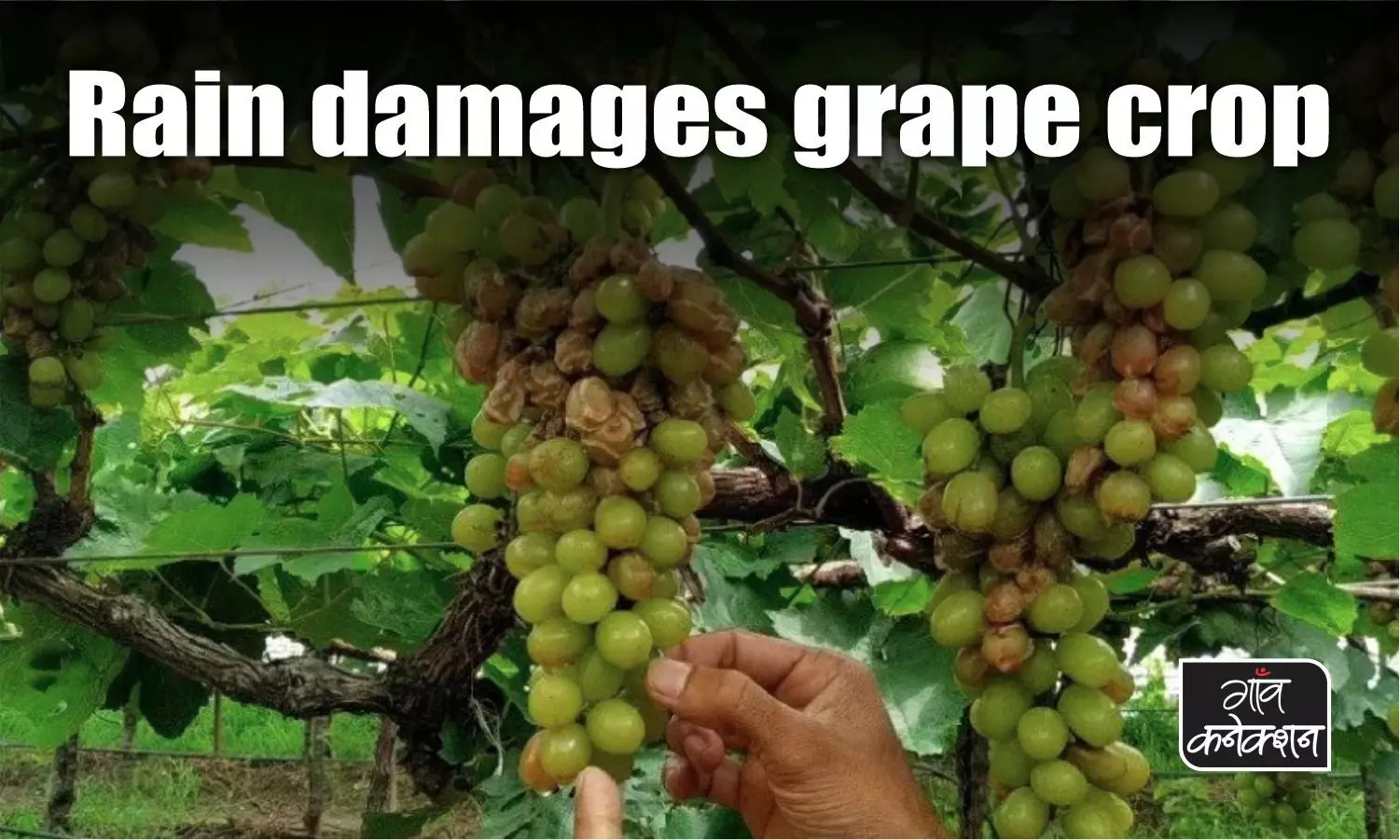In Maharashtra, rains quash grapes mercilessly. You may have to shell out more to buy grapes this season
The early crop of grapes has been severely hit by incessant rains. Several farmers have incurred losses in lakhs
 Arvind Shukla 9 Oct 2019 10:13 AM GMT
Arvind Shukla 9 Oct 2019 10:13 AM GMT

Incessant rains of the recent past have adversely affected the farmers across the country. Worst affected are the grape farmers of Maharashtra wherein several farmers have reported losses of Rs 10-20 lakh each.
Jibhau Bhamare, 55, of Pingalwade village in Satana taluka, Maharashtra is in a state of shock. His two acres grape crop was almost ready for picking when the rains of October 5-6 spoiled the entire farm. With a heavy heart Bhamare said that his crop had been ready and the harvesting was supposed to begin in next 4-5 days. His farm had the produce weighing about 20 tonnes, which was to be shipped to Europe and Kolkata, but it wasn't possible anymore and he suffered a loss of about Rs 17-18 lakh. As per Bhamare, besides the crop his multi-tier system had also collapsed in the rain which takes lakhs of rupees to install.
Nashik, Pune and Sangli districts of Maharashtra cultivate grapes on a large scale. Several rounds of incessant rains during this year monsoons have gravely affected the early crop of grapes. Satana, Kalvan and Malegaon in Nashik are known for their early crops of grapes which have been burst open due to the rains of late September and first week of October resulting in huge losses to the farmers.
Watch the video here:
About 250 kms from Mumbai, Satana taluka's Pingalwade and its surrounding villages have had their crops spoiled. About 3 kms far from Pingalwade is the Karanjar village where a young farmer Deepak Kalu Devare had suffered loss in his one-and-a-half-acre farm. Deepak informed over phone: "Our region produces the first crop of grapes and gets good price for the produce, but the recent rains have crushed the fruit resulting in 20-25 per cent loss for the early crop. Further rains can take the losses higher up to 80 per cent."
Deepak goes through weather information several times a day and says that Nashik has a rain forecast for up till October 12-14. Should it be the case, the losses would be immense. As per Jibhau, the tehsildar and officials from agriculture and horticulture departments have surveyed the fields, but he is skeptical that anything would come out of it. With the rest of Maharashtra under frenzy of Vidhan Sabha elections, Nashik farmers have mixed reactions. Rains have spoiled nearly every crop, including tomato, grape and onion, but the farmers who were spared are benefitted with good rates for their crops.
Gaon Connection team camped in Nashik from September 25-27, during which it visited many areas. At certain farms in Satana, grape-harvesting was being done. Krishna Deware of Parner village was seen harvesting the grapes wherein the quantity of felled grapes far exceeded the harvested ones.
When asked, Krishna Deware shows an array of grapes and said: "See, all these have burst open and are rotting away. I have four acres of grapes out of which two acres will soon be ready for picking. I had even started picking a few and getting a rate of Rs 90 a kilo, but then the rains occurred and spoiled my crop. 60 per cent of grapes have gone bad in my farm.
Krishna said: "There is an average annual expense of Rs 3-4 lakh per acre of grape farming. Everything remaining fine, one makes an income of Rs 6-7 lakh (Rs 4 lakh after cost deductions). However, grape farming is quite risky because grapes suffer the maximum due to variations in rains, sunlight and cold.
Grape farm takes 18 months to be readied and further a year to bring out a harvest. A crop takes 110 to be ready. Farmers prune their grapes farms twice a year—those sowing early crops trim it in June-July and others by September-October.
Deepak informed that the farmer does early farming of grapes solely upon his risk. Although contingent upon weather and market rates early farming fetches good price. Its contingency upon weather is due to the fact that it is deprived of any government aid and insurance while the later crops are supported to some extent by the government.
Also Read: Onions make farmers, common people cry, yet again
Also Read: Ground report: "This rain is a poison for our tomato crop"
Also Read: After onions and tomatoes, now soybean gives farmers a headache
More Stories




